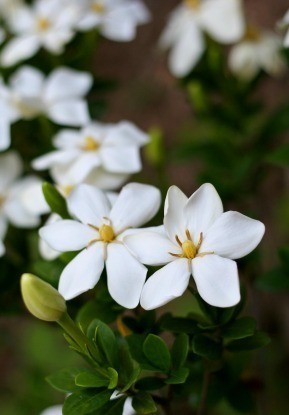 A visually appealing garden is made even more beautiful by sweet smelling flowers and plants. If you deliberately plant for fragrance each season, here are a few handy tricks for capitalizing on those heavenly scents.
A visually appealing garden is made even more beautiful by sweet smelling flowers and plants. If you deliberately plant for fragrance each season, here are a few handy tricks for capitalizing on those heavenly scents.
Fence in the fragrance: Consider 'fencing in' your fragrance by enclosing sweet smelling areas with a small fence or establishing a windbreak using trees and shrubs. In cooler climates, creating a sheltered area will accomplish two things: prevent the wind from quickly dispersing scents and provide extra warmth, which heightens the fragrance of many plants.
Closer is better: Furnish outdoor living spaces with fragrant plants so that they are always close enough to enjoy. Place your most fragrant plants near the deck or patio, beside the front and back doors, and in window boxes. Whenever possible, plant low-growing plants in raised beds or planters in order to bring them up to 'nose' level. When locating fragrant plants, determine the direction of prevailing summer winds (usually from the southwest). You will want the plants' fragrances wafting toward your entertaining areas, not away from them. Always keep in mind that beauty is in the nose of the beholder. An overabundance of different fragrances, particularly in small areas, can be quite overwhelming.
Force foliage encounters: When we think of fragrance we tend to think of flowers. But the foliage of many plants also brings wonderful scents to the garden. The main difference between foliage and flowers is that foliage usually needs to be touched to release the scent. When placed strategically, you can force foliage encounters in the garden. Plant creeping herbs like thyme or chamomile between steppingstones or next to garden benches. Plant larger plants like lavender, mint, or rosemary along garden paths, so that their foliage is easily brushed by people passing by.
Make fragrance mobile: Containers of fragrant plants allow fragrance to be mobile. It also makes it easy to elevate scented plants to nose level. In devising fragrant container combinations, take into consideration color compatibility, growth habits, and growing requirements. By mixing only one scented plant per container among other plants, you won't have to worry about competing scents.
Container ideas:
flowering tobacco (nicotiana spp. and cultivars)
heliotrope (Heliotropium arborescens)
sweet alyssum (Lobularia maritima)
petunia (Petunia hybrids)
scented geraniums (Pelargonium spp.)
stock (Matthiloa incana)
pinks (Dianthus spp. including D. pulmaris and D. superbus)
Form a framework of fragrance: Trees and shrubs form the basic framework of every garden. They also make it possible to have fragrance almost year 'round. Choose among the fragrant trees and shrubs that define each season. Because they will have a major impact on the appearance of functionality of your landscape make sure you consider each plant's shape, height, and spread along with its fragrance.
Woody plants for spring:
Caroline allspice, sweet shrub
Daphne
fringe tree
mock orange
lilac
Woody plants for summer:
summer sweet
magnolia
butterfly bush
Woody plants for fall:
thorny eleagnus
wintersweet
winter honeysuckle
witch hazel
Surround structures with scent: Imagine walking under a cascade of wisteria, honeysuckle, or heavily perfumed climbing roses. Arbors and pergolas are another way to surround your senses with fragrance, as are fences, trellises and planting niches in retaining walls.
Fragrance is a matter of timing: When considering which fragrant plants to grow, keep scent time in mind. It won't do you much good to plant for fragrance if you are never around to enjoy it. When do you spend most of your time in the garden? Most highly-scented flowers smell their best during the morning and afternoon hours. There are also night-scented varieties, such as flowering tobacco, four 'o'clocks and evening primrose, that emit their best scents during evening hours.
Ellen,
Your garden sounds delightful. A few more plants the readers might want to consider are Sweet Woodruff (Galium Odoratum), a perennial ground cover which emits a heavy perfume when the leaves are bruised. If you should be fortunate enough to find and grow a bit of Vetiver grass, please do. It's oil is used extensively in perfumery. It has a lovely scent.
Bee Balm (Monarda) is another plant which emits a rather heavy perfume. It also attracts butterflies. Roses are always a good idea. After years of growing them, I found 'Mirandy' to have the most delicious and most intense odor of any rose.
Another nice scent to encounter in the garden is Tangerine. I grew a tangerine from seed. When it was about two feet high, I placed it in the garden near where I sat. It gave off a most interesting scent.
Scent wise, I think of Petunia as Jekyll and Hyde. On a crisp, dry day, they are nice to be around. After a good rain... they have a scent reminiscent of a wet dog.